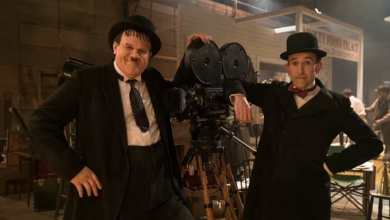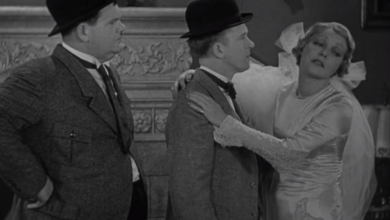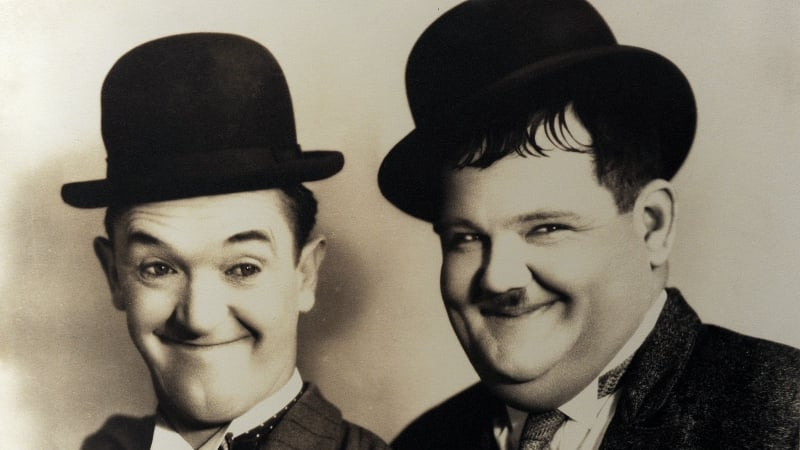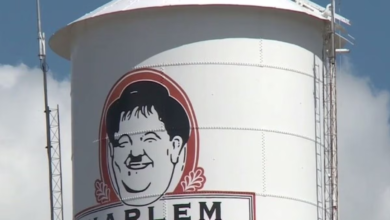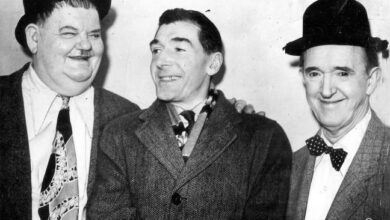Secrets and Lies. Laurel and Hardy in “We Faw Down” (1928).
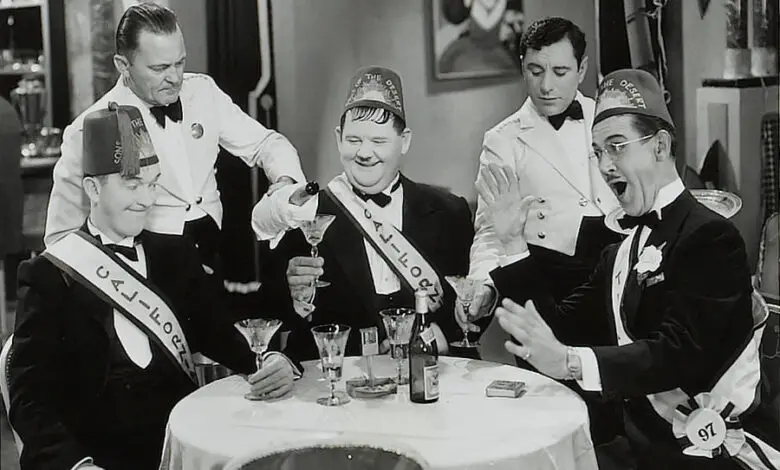
This is one of those marital comedies. Marital exposure rather than economic ruin is the looming threat throughout. Stan and Ollie are seemingly affluent middle class types who live in justified terror of their wives and are racking their meagre brains to find a way of sneaking out to a poker game.
In some ways this silent short anticipates key aspects of Sons of the Desert, the acme of all Laurel and Hardy domestic comedies.
The boys claim they’re forced to accept an invitation from the Boss to go to the theatre. On their way to the pokergame though, their chivalric instincts on behalf of a gangster’s moll result in their getting themselves soaking wet and them being invited back to moll’s apartment to change their clothes. Who will kill them first? The gangster (the infamous”One Round”) or their own wives?
Dressing-gowned and drinking with two floozies, Stan is all injured innocence while being molested. In a scene charged with pathos, Stan’s face and hair are mauled about “playfully” while Stan struggles to defend himself. He doesn’t want to play, and his plight is genuinely pitiable.
“One Round” returns to interrupt the frolics, and a only a timely pie to the face gives the boys enough time to sort of grab their clothes and climb out of the window. As they drop with trousers half on into the street while girls wave goodbye to them, they are espied by their own wives, who may be forgiven at this point for getting the wrong idea.
The wives are out and about because the Orpheum Theatre, where Stan and Ollie claim to have been, has burned down – a spectacular and dangerous conflagration that everyone in the city with the exception of our heroes is talking about. The remainder of the film therefore consists of the lying account of the matinee performance that Stan and Ollie (mostly Ollie) give to their wives who know of their mendacity from the outset.
The clever bit occurs when Stan, who is behind the wife-laden couch spies the advertised billing for the Orpheum show on the lower half of a folded newspaper and tries to mime the programme to Ollie so that he can accurately explain the order of entertainments to their better halves. This joke, incidentally, is adapted for an episode of Fawlty Towers, some fifty years later. Eventually, Stan adjusts the newspaper to reveal the headline – the burning of the Orpheum and the camera subsequently spends a deal of time staring at Stan’s face as he slowly absorbs the full extremity and consequences of their joint folly. The camera hadn’t spent as much time doing that since Their Purple Moment. He then waves the headline at Ollie who is in the middle of a descriptive hula dance involving a lampshade.
Then attention turns to Ollie’s face. With breathtaking and hilarious patience, we see first of all the horror of recognition dawn on him, and then the protracted and painful process of his constructing some sort of excuse. Eventually it dawns on him to say “It’s a good thing we went to the Palace instead of the Orpheum” (a line good enough to make you yearn to push the film a bit further forward in time to a sound stage where Ollie could repeat it in his own voice rather than relying on a caption). Stan finds this desperate punchline hilarious and falls about. Unfortunately, this is not a scenario that can be solved by tolerant laughter, but only with gunplay.
As Stan and Ollie are pursed by their armed wives out of the house and around the corner the report of the rifle frightens a plethora of underdressed errant husbands to spill out of every available street window – a joke so good, it was used again in Blockheads, a decade later.
We Faw Down (1928) doesn’t have an especially high reputation within the Laurel and Hardy canon, but it demonstrates the amount of hilarious time that can be profitably devoted just to staring at someone’s face. As with much of the best Laurel and Hardy, it’s not the gag, or the joke, or the situation that’s cherishable, it’s the reaction. Always – the reaction.
I’ve a few thoughts on some other early Laurel and Hardy films…

